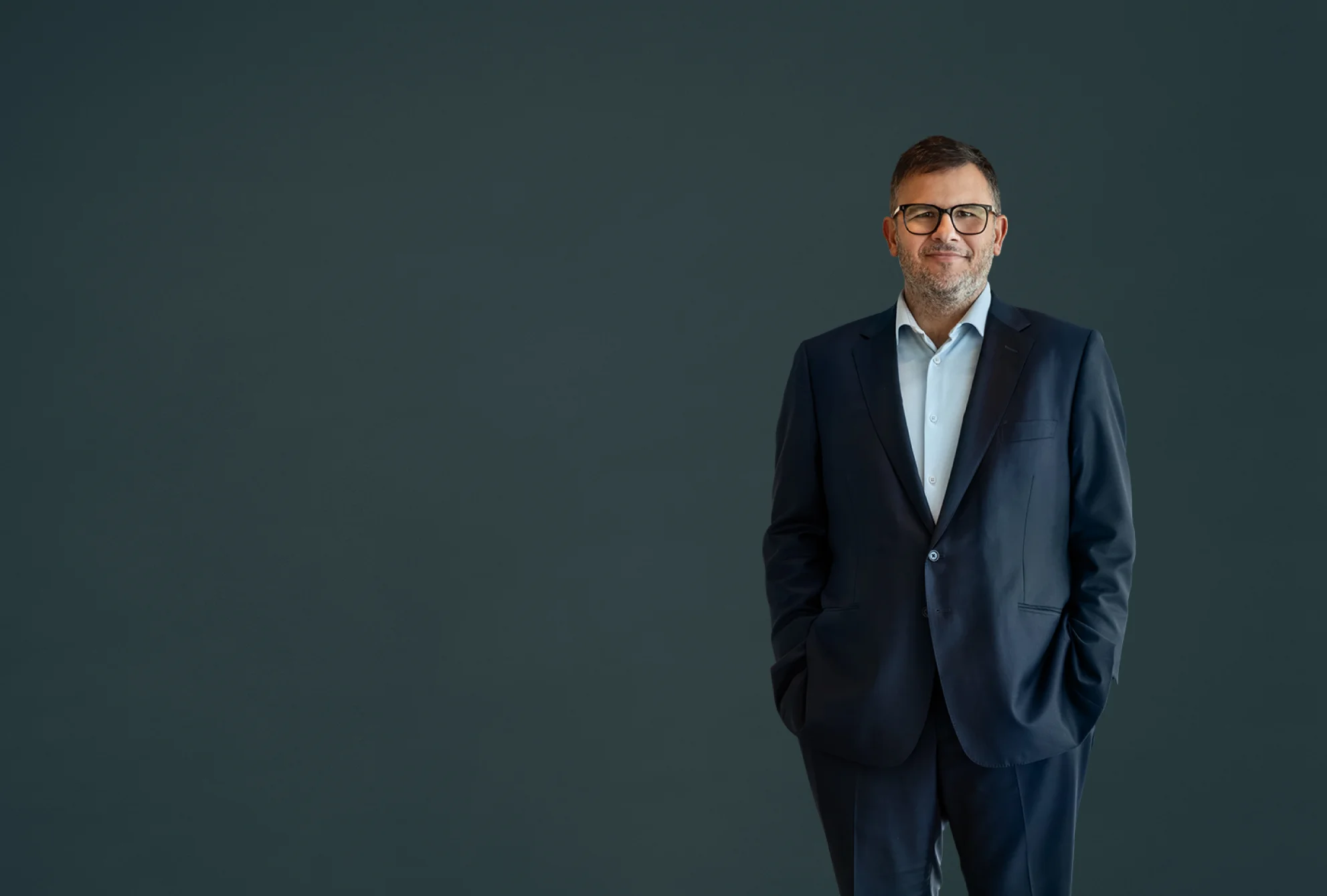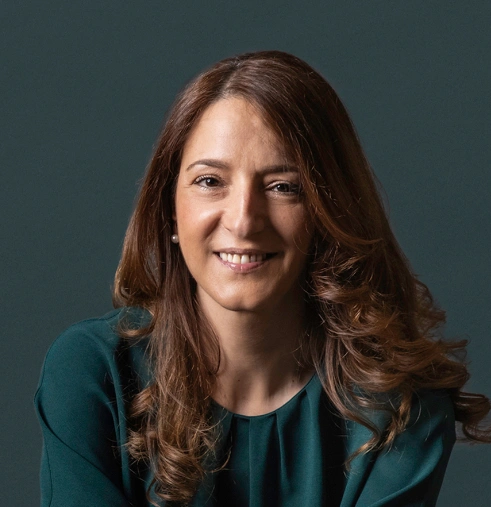Nonconformism
Impact
Empathy
Diversity
Courage


Nonconformism
Impact
Empathy
Diversity
Courage
Sustainability Report:
Transparency
We are proud to present our 2023 Sustainability Report. This marks another chapter in our sustainability journey, which formally began with the development of our current strategy in 2020.
This is a transparent snapshot, not just of 2023 but of the last three years in total, of our sustainability performance, particularly in our priority areas of mental health and wellbeing, diversity and inclusion, and responsible business. It details our progress and identifies key metrics, outstanding initiatives and areas that will require our greatest attention in the coming years.
Many people have contributed to this report, all of whom have played a fundamental role in achieving the results presented here. As in previous years, we continue to monitor and report on our economic, social and environmental practices in accordance with the standards of the Global Reporting Initiative (GRI).
The publication of this report completes a strategic cycle. In 2024, we will enter a new phase of consultation with our stakeholders to shape our strategy for the coming years with new ambitions and commitments.
This report covers the period from 1 January 2023 to 31 December 2023. We are always available to talk about our work and this report in particular. Please do not hesitate to contact us with any questions, suggestions or comments you may have.


Bruno Ferreira, Managing Partner
The next three chapters describe what each of these three key priority areas means to us, the work we have done on them and where we are falling short. For each area, we have defined commitments for which we can be held accountable in the years to come.


wellbeing
wellbeing
A commitment to our people and our business
Our mental health and wellbeing journey reached an important milestone in 2020 when we signed the Mindful Business Charter. In 2021, we made six commitments with the aim of improving the wellbeing of our employees and with the ambition of becoming an industry leader. At the end of 2023, we can proudly say that we have achieved all the goals we committed to at the beginning of this strategic cycle.
Among the various initiatives that have taken place, we would like to highlight our efforts in 2021 to expand our practice of listening to employees and measuring their satisfaction by extending the annual survey. In 2022, we encouraged internal debate through the Conversas Soltas (Open Conversations) initiative, which led to the creation of the People Advocates, who are responsible for ensuring the wellbeing of a group of employees in each department. This is now essential for monitoring the physical and mental wellbeing of our teams.
In 2023, we will strengthen initiatives such as the People Advocates by training more people for this role and by introducing a pulse survey. This survey, which we will talk about later, is an essential tool that gives us insight into the day-to-day reality of health and wellbeing at PLMJ. Alongside these initiatives, we continued our work to inform and raise awareness of human resources policies that promote a better balance between private/family life and work. As part of this, we held more than 20 'Did you know?' sessions to explain internal policies such as the 'hours bank' for antenatal consultations and adoption procedures.
And we know we cannot stop here. Now that this strategic cycle has come to an end, we are reflecting on what has happened and what we need to do to navigate the road ahead.
Our journey has been marked by the implementation of the Wellbeing Day, the review of internal policies to ensure greater flexibility and work-life balance. We also focused on developing our talents by strengthening non-legal skills, both in the annual training plan and in the annual wellbeing plan. Our initiatives covered the various fronts of wellbeing (mental, physical and relational), the introduction of People Advocates and, finally, the launch of the pulse survey.
The consolidation of a culture and working environment that helps people and the business to thrive in a sustainable way depends on the consistency of these actions. It also depends on our ability as a business to continue to develop solutions and respond to our people's needs in these areas.


We have implemented a pulse survey that allows us to measure the wellbeing of our employees in real time.
We chose the Eletive platform, which combines artificial intelligence with the expertise of doctors and psychologists, to develop a questionnaire for our employees. The questionnaire contains 46 questions in 11 different areas and adapts to each person's latest answers. It reinforces questions where the response was most negative, allowing progress to be assessed in the most critical areas, and offers advice to help the employee deal with the situation.
The responses are completely anonymous but give the HR team access to a highly informative snapshot of the teams' wellbeing. It also makes it possible to identify trends and build relationships that lead to real changes in internal policies.
Finally, the new pulse survey is also a way to encourage employees to take a moment to reflect on their wellbeing, access historical data, identify fluctuations and act on the most critical areas.
The launch of new institutional initiatives needs to be accompanied by a change of mindset.
There is still a lot of capacity building to be done. In addition to the various initiatives we have taken at different levels, we need to change mindsets and raise awareness of the importance of mental health and wellbeing.
There are ingrained habits and practices that need to be changed. To do this, it is important to work consistently to cultivate a culture of feedback, to train the next generation of leaders with the skills to manage a team holistically, to strengthen social skills training and to continue to promote external debate.
We also have great confidence in the younger generations who are challenging us to go further. We want to continue to listen to them and let them challenge us. This is the only way we can continue the path we have been taking.
In 2024, we intend to maintain an average pulse survey response rate of 60%.

wellbeing


inclusion
For the sake of our people and our business, we strive to be a diverse and inclusive team.
As an employer, PLMJ is a place where everyone can contribute and grow, regardless of gender, race, sexual orientation, socio-economic background or religion. From a business perspective, we see diversity as a key factor in our competitiveness, as a more diverse team is better able to meet the diverse challenges of our clients. Inclusion, in turn, is the catalyst for the potential of a diverse team. We can only attract and retain diverse profiles if we have an inclusive environment within our organisation that ensures everyone feels they belong equally.
Reflecting on our journey in this area, 2021 marks the formalisation of several commitments to gender equality: we joined HeForShe Portugal, becoming ambassadors for this movement, supported the Leading Together initiative led by the INSEAD Alumni Association, and participated in the UN Global Compact’s Target Gender Equality Acceleration Program. We also did a lot of work monitoring and analysing internal policies that have a significant impact on gender equality, particularly in relation to parental leave policies and flexible working.
The year was marked by dialogue and the strengthening of initiatives launched in the previous year. The Conversas Soltas (Open Conversations) allowed us to listen to our employees and understand how PLMJ could improve in diversity and inclusion (D&I). With this informal format it has been possible to create a safe space for our people to speak freely about issues such as being a mum, a dad, a woman, living alone, being part of the LGBTQ+ community, having a chronic illness or having a large family. These conversations have resulted in policy changes, demonstrating the importance of listening to and being influenced by our colleagues, especially on issues as important as this.
In 2023, the Trainee Lawyers Committee took on an even more important role in attracting the best talent. Measures were implemented in the recruitment process, such as gender parity in interviewers, which minimises potential bias in the selection of candidates. We have also worked with the APSA (Portuguese Asperger's Syndrome Association) to integrate two people with Asperger's Syndrome into PLMJ projects.
Over the next few years, we will continue along this path, which is far from complete, making plurality one of PLMJ's greatest strengths.
While it's true that an exceptional lawyer must master the law, it's also true that mastery of the law is now an Olympic minimum, especially when we're talking about the country's largest firms.
Clients want strategic vision, a focus on results, creativity and innovation. As a firm, we can only meet these needs if we have truly diverse talent. To have this diversity of thought, we need to ensure not only gender diversity, but also social and experience diversity.
We want PLMJ to continue to attract the most diverse talent by understanding how to value and above all maximise these differences for the benefit of our clients and PLMJ.


We have minimised recruitment bias.
To identify and attract the best talent, we need to ensure that the recruitment process minimises the potential biases that interviewers may have. We know that lawyers from different practice areas tend to judge candidates on the qualities they consider relevant to their area of work.
For this reason, the Trainee Lawyers Committee has introduced gender parity in the assessment panels and defined that the panel should be made up of lawyers from different practice areas. With a more diverse panel, we are better equipped to recruit profiles with different characteristics that are valuable to PLMJ's performance.
Reflecting efforts in results.
We are very proud of the progress we have made, but we know we can do more when it comes to D&I. We know that it takes time to see the results of our policies, so we believe that we will continue to see an increase in gender parity in top positions over the next few years.
In addition, there are other areas where we can raise the bar if we want to continue to lead in this area, such as the recruitment of people with disabilities or from diverse minorities.
In the coming years, we will continue this path, always involving our employees so that we can grow together and broaden our horizons.
To conduct a survey of employees on their sense of belonging to assess PLMJ's performance in terms of inclusion.

inclusion


business
The cross-cutting nature of Responsible Business at PLMJ is complete, leaving us with the challenge of choosing what to highlight in this report.
This priority begins internally, as this is the only way we can legitimately support our clients in rethinking their business to be more responsible. Over the past three years, there have been countless examples of initiatives that have helped to make PLMJ and its business more responsible. In 2023, we highlight the implementation of the Greenole platform, which we describe in more detail later in this chapter, and the formalisation of the signing of the UN Global Compact, a voluntary initiative to adopt corporate social responsibility and sustainability policies proposed by the United Nations.
Externally, we do this in four areas: (1) with social organisations through pro bono legal advice, volunteering and philanthropic support; (2) by sharing our experience with other companies in relevant forums; (3) by promoting legal literacy through workshops in schools and information sessions; and finally (4) through our responsible business practice, where we advise companies on ESG issues.
This last area of activity has grown exponentially in this strategic cycle. The need for legal advice on sustainability is growing, particularly because of the speed with which regulations are being created, the scope of the companies affected and the short deadlines for implementation. Against this backdrop, the boldness with which we have taken on the new challenges presented to us, particularly in this area of considerable uncertainty, has made our work increasingly valuable. Much of the work we have done in recent years has been truly pioneering for our clients, ourselves and the regulators involved. They have required us to produce documentation that has never been produced before and to anticipate questions that have never been asked before.
By giving our clients confidence and reducing the risk of experimenting with innovative transactions, such as issuing green bonds or creating an Article 9 fund under the SFDR (Sustainable Finance Disclosure Regulation), we have played a key role in the development of responsible business in Portugal.
And we are only just beginning. The opportunities and demands for our clients to become more responsible will only increase, and we will be there to support them along the way.
Together, we faced the challenges of adapting to European and national regulations and explored opportunities to implement more sustainable and ethical best practices. This journey has not only strengthened our relationships with our clients, but also our mission to drive change and deliver tangible results. In the years ahead, we will continue to innovate and increase the positive impact we can have.


We have strengthened the role of the PLMJ Foundation, our pro bono support and our responsible business practice
The Foundation: PLMJ and the Foundation have strengthened their commitment to the community around two pillars: education and the promotion of young talent. The Foundation supports young artists and promotes the arts in Portuguese-speaking countries. We believe that the arts are an essential link to communities and that investing in the arts is a way of giving back. We also want to bring the arts to communities that would not normally have access to them. We work with local schools and develop workshops and gallery visits. In the last quarter of 2023, the PLMJ Foundation organised Transition Zones at the Cordoaria Nacional, an exhibition of around 150 works by more than 90 artists from the collection. In a joint initiative with EGEAC and the Municipal Galleries of Lisbon, this exhibition celebrated art and artists, reinforcing our mission to promote contemporary art in Portuguese.
Pro bono: In the area of pro bono, we supported several projects, including the creation of the association Une-Idades, which aims to combat the lack of housing for students and the isolation of the elderly by promoting a solution for sharing housing between two generations. We also continued to work with SOMA, an organisation with which we have been working since 2021, by providing ongoing legal support. The association, which operates in Lisbon and São Tomé and Príncipe, aims to combat gender inequality through surf therapy. In total, 17 organisations were supported by 141 lawyers for a total of 3,631 hours.
The responsible business practice: The range of issues on which we have advised clients is vast. Examples include green finance, sustainability linked loans, public offerings of green bonds, private placements of green bonds and commercial paper, renewable energy project finance advice and advice on the implementation of European regulations.
Ensure that all our employees feel involved in the journey towards responsible business
Internally We often wonder if everyone at PLMJ can say they have done something for sustainability. The institutional initiatives are numerous and cover (almost) all the priority areas for sustainability, from supplier management to diversity and inclusion, mental health and wellbeing, talent attraction, career management and many others. However, we see a need for greater awareness at all levels of the organisation of all the efforts underway to ensure that our management and employees are fully aligned with the institutional social and environmental proposals.
Externally In recent years, the growth of our ESG practice has been organic. The increasing number of requests from our clients has led our teams to devote more and more time to this area.
In the coming years, we will honour our commitment to sustainability and our clients’ success by broadening the range of ESG issues we support our clients on and ensuring our ability to respond to the needs that will continue to arise.
Greenole, which we have been working with since 2021, is a platform that allows us to collect and analyse information about PLMJ's environmental performance, particularly that of its buildings. The aim is to find solutions for greater resource efficiency. The aim of this project is to monitor all consumption in our buildings, not only to report on it, but also to ensure that it is optimised by making the most of our smart building technology.
The move to a newer building in Lisbon has already made it possible to reduce various types of consumption. However, we wanted to make sure that we were taking advantage of all its features to minimise our consumption, always with a view to achieving carbon neutrality in the long term.
The project we developed with Greenole resulted in a platform where we can access the consumption of the different PLMJ offices. The different areas where information is collected are energy, water, carbon footprint, waste and travel. The platform provides an overview, but also a breakdown by office, so that different time periods can be analysed. This tool has been instrumental in gaining an in-depth understanding of our consumption and identifying opportunities for optimisation.
The project also aims to involve employees in our sustainability goals. In addition to a reporting and monitoring tool, Greenole is developing an intuitive and visually accessible platform that will allow us to communicate our updated consumption in common areas of the office. By communicating this information on a more regular basis, we hope to influence behaviour and involve everyone in the journey towards carbon neutrality.
Small adjustments have had significant results in reducing energy consumption in the Lisbon building.
The project with Greenole made it possible to identify several opportunities for reducing energy consumption, especially in the Lisbon office. Some examples of the measures implemented were the programming of a reset of room temperatures when they are unoccupied to a standard temperature, the establishment of maximum and minimum temperatures and the reduction of the intensity of lighting systems to 80%.
We estimate that this set of changes has reduced total energy consumption in the Lisbon firm by 22.5%, while maintaining total comfort for those who frequent it.
Publicise our consumption more regularly and involve everyone in the journey towards carbon neutrality.
By 2024, we will extend this initiative to all our offices and endeavour to reduce consumption to a minimum, with the aim of achieving carbon neutrality as a firm. At the same time, we have the ambition to involve everyone in this journey. We are going to create an interface that allows us to communicate consumption in real time to influence behaviour. We want the path to sustainability to be experienced by our employees every day and not just from year to year at reporting time.
The efforts to reduce energy consumption underway at the Porto office are aimed at a 10% reduction by 2024.

business

As we close this chapter of our sustainability journey, I'm inspired by the progress we've made and the collective commitment that is driving us forward.
Ensuring transparent and responsible communication of our environmental, social and governance (ESG) performance means adopting a common language and clear structure in our reporting, as well as maintaining an open and constructive dialogue with all our stakeholders.
To this end, we have chosen to report in accordance with the standards of the Global Reporting Initiative (GRI), in particular GRI 2: General Contents 2021, which is internationally recognised as the benchmark for sustainability reporting. We have not attempted to comply fully with the standards but have adapted our approach to prioritise the indicators most relevant to our activities and size. This adaptation allows us to focus on the aspects of sustainability that are most important to us and our stakeholders, ensuring transparent reporting in line with our objectives and values.
GRI Disclosure






